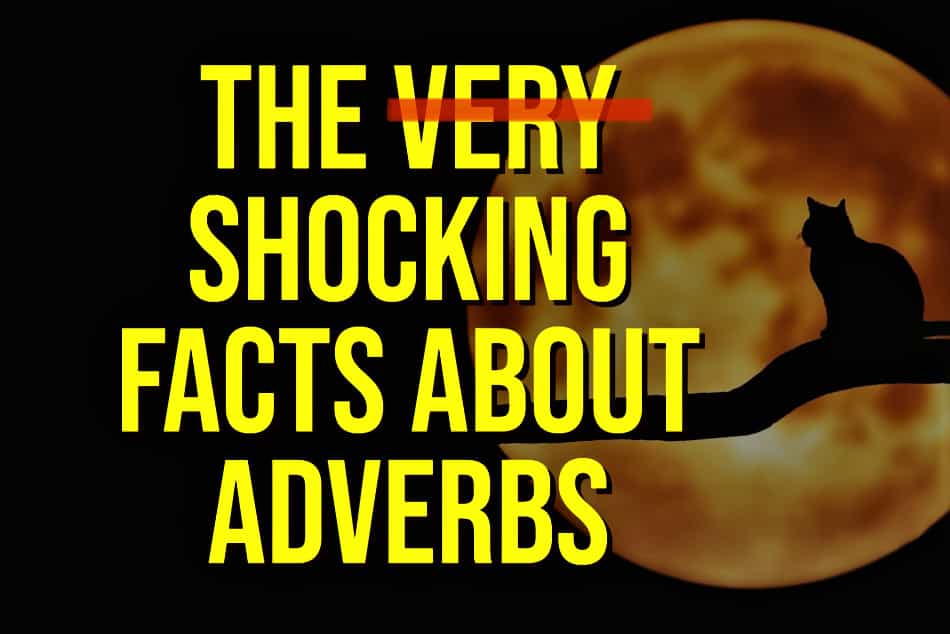An adverb is just another word hanging out in sentences with nouns, verbs, and adjectives. However, the adverb may be the planet Pluto of word forms: it gets no respect. Hemingway avoided them, and according to Stephen King, “the road to hell is paved with adverbs.”
So why all the haters? Shouldn’t your prose be plentifully peppered with periodic adverb usage?
What are they good for?
Adverbs are words that modify verbs, adjectives, other adverbs, or sentences. They tell how, where, when, why, under what conditions, or to what degree.
Edgar painstakingly studied his rival’s poem. (describing the verb “studied”)
He knew he was a much better writer. (describing the adjective “better”)
But he was nearly always anxious. (describing the adverb “always”)
Fortunately there was more than one way to chase away the blues. (describing the whole sentence)
Look at the above sentences. Would they be better without those blue adverbs, or do the adverbs effectively deepen each sentence’s meaning?
The adverb at work
Adverbs may do real yeoman’s work in a sentence.
They may express the manner in which an action is carried out:
Edgar patiently waited for a response after mailing his poem to an editor.
An adverb might describe where something happens:
He made a massive macramé birdcage downstairs.
Or how often it occurs:
He never imagined it would take this long.
An adverb might explain when an event occurs:
The black cat disappeared yesterday.
It might intensify other adverbs, verbs, and adjectives:
The editor absolutely loathed his poem. Edgar felt much worse.
Fact is, even minimalist Hemingway couldn’t altogether avoid adverbs. LitChart scientifically broke down his sentences and found that the adverbs he favored tended to be place adverbs (“up,” “out”), frequency adverbs (“again,” “never”) and time adverbs (“then,” “now”). But not manner adverbs: those are woefully mushy.
Infamous, misused, overused adverbs
Hopefully, none of these examples will make you feel very badly.
“Hopefully” is notorious, but it’s been used incorrectly for so long that some dictionaries have given up and accept this infamously incorrect usage.
“Hopefully the sentence is correct.”
Nope. This suggests a sentence with hopes and dreams all its own. Better sentences include:
“I hope the sentence is correct.”
“Edgar searched hopefully for the missing cat.”
Another notoriously misused adverb is “badly.”
“He felt badly.”
Un-uh. This does not indicate sadness. Instead it may suggest a person with deficient senses. A better sentence would be “He felt bad.”
One adverb that I personally have an antipathy for—and writers I have worked with know this—is the word “very.” I prefer terse prose with fewer words. “Very” is very overused. I very often cross it out. I think sentences are very much better without it.
If something is already the best, need it be the very best?
Critics contend that adverbs signal a lazy writer, they weaken prose, and ultimately provide a less engaging reading experience.
I hope that none of the above made you feel bad.
Expertly placed adverbs
Where adverbs go in a sentence can be tricky. As usual, there are exceptions to rules, and sometimes the placement of adverbs is a stylistic choice. Generally speaking, adverbs should be put as close as possible to what they describe—usually placed before.
Adverbs modifying other adverbs and adjectives are usually found before.
The notoriously prickly writer quickly composed a response.
If the adverb describes something indefinite (never, often, typically, always), the adverb will also go before.
Edgar’s scribbled screeds rarely resulted in positive outcomes.
That’s why he usually burned his late night writing.
When describing how something is done (“the manner,” above), the adverb may go before the verb:
Edgar unexpectedly met a more astute admirer.
However, to stress the adverb’s meaning, put it at the end of the sentence:
Edgar met a more astute admirer unexpectedly.
Adverbs of time, place, and definite frequency usually go at the end of a sentence, though, for emphasis, the adverbs “here” and “there” might instead be placed at the beginning.
Edgar now writes one poem daily.
And there was the black cat, safe and sound, curled up under his bed.
How to cut your manuscript
If your book is overlong, consider following the advice of bestselling author Hank Phillippi Ryan who suggests one way to trim down a weighty word count is to go through the text and cross out the modifiers. Do you really need them all?
Writing successfully
Adverbs may indeed beneficially bolster a verb or adjective, but they should be used sparingly.
Anti-adverbial influencers contend that adverbs are entirely superfluous; they unnecessarily clutter sentences. When the goal is absolute simplicity, they should be cut.
Maybe that’s not the worst argument, but sometimes adverbs can be incredibly useful.
Are adverbs glorious or gratuitous? Choose sides on Facebook.





